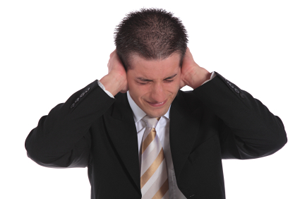Tinnitus & Hyperacusis
Appointment Request
Tinnitus

Tinnitus is a hearing condition where people hear noises, hisses or hums that have no external source – this unreal sensation is often described as a ‘ringing in the ears,’ which can either be low or high-pitched. It can be intermittent or continuous and can occur in one or both ears and is often most noticeable in quiet listening environments. In almost all cases, tinnitus is a subjective noise, meaning that only the person who has tinnitus can hear it.
Tinnitus can be a symptom of a condition that is related to many forms of hearing loss, or it may exist without hearing loss. Tinnitus is not a disease. Tinnitus is a symptom that may result from a number of medical conditions. Tinnitus may result from age-related hearing loss (presbycusis typically begins after the age of 55), ear injury, or a physiological condition.
Tinnitus may have a physiological or biochemical origin. Common causes of tinnitus include impacted wax near the tympanic membrane (eardrum), hearing loss, exposure to excessive noise (either ongoing or one time noise trauma), head/neck trauma, whiplash, large doses of ototoxic drugs such as aspirin (over 200 medications have tinnitus as a listed potential side effect), problems in the neck or jaw, or any type of physical or emotional stress. Less common causes include a non-malignant tumour on the vestibular nerve (vestibular schwannoma), a fixation of the middle ear bones, or other relatively rare medical conditions. The following blood vessel disorders MAY cause pulsatile tinnitus.
Atherosclerosis is a large build-up of cholesterol and other fatty deposits in major blood vessels close to your middle and inner ear. The blood vessels lose some elasticity and therefore the ability to flex and expand with each heartbeat. This causes the blood flow to become more forceful and turbulent, making it easier for the ear to detect heart beats. High blood pressure, including hypertension and factors that increase blood pressure such as stress, alcohol, and caffeine, may make tinnitus more noticeable. Repositioning your head may cause the sound to disappear. Narrowing of the carotid artery or jugular vein can result in turbulent blood flow and head noises. Malformation of capillaries, also called arteriovenous malformations, can occur in the connections between arteries and veins which can result in head noise.
Individuals with normal hearing can also suffer from tinnitus. Having tinnitus does not mean that one will lose their hearing.
Although there are many theories about how sounds in the ears or head are produced, the exact process is not fully understood. The most widely accepted theory, when tinnitus occurs with hearing loss, is damage in the cochlea. More specifically, damage to outer hair cells. Many researchers believe that when the structure of the hair cell collapses, random stimulation of the auditory pathways occurs. More current research of Martin Pienkowski, suggests that tinnitus results from a locking of spontaneous neuronal firings at the level of the cochlea and brainstem. All individuals have spontaneous neuronal activity, however; in individuals with tinnitus, the “locking” of this activity enhances the sound signal.
Our Locations
Mount Waverley
(Pinewood Shopping Village)
- Level 1, 407 Blackburn Road
Mount Waverley, VIC 3149 - 03 98867157
- contact@allearshearing.com.au
- Monday: 9:00am – 5:00 pm
Tuesday: 9:00am – 5:00pm
Wednesday: 9:00am - 5:00pm
Thursday: 9:00am – 5:00 pm
Friday: 9:00am - 5:00pm
Saturday: Only on request. Weekend charges apply
Bentleigh East
- 869 Centre Road
- Bentleigh East , VIC 3165
- 03 98867157
- contact@allearshearing.com.au
- Wednesday : 10:30 am – 5 pm
Yarra Junction
- Yarra Junction Arcade
Shop 4/2456 Warburton Hwy
Yarra Junction, VIC 3797 - 03 98867157
- contact@allearshearing.com.au
- Tuesday: 9:30 am - 5:00 pm
Friday: 9:30 am - 5:00 pm



 View on Map
View on Map